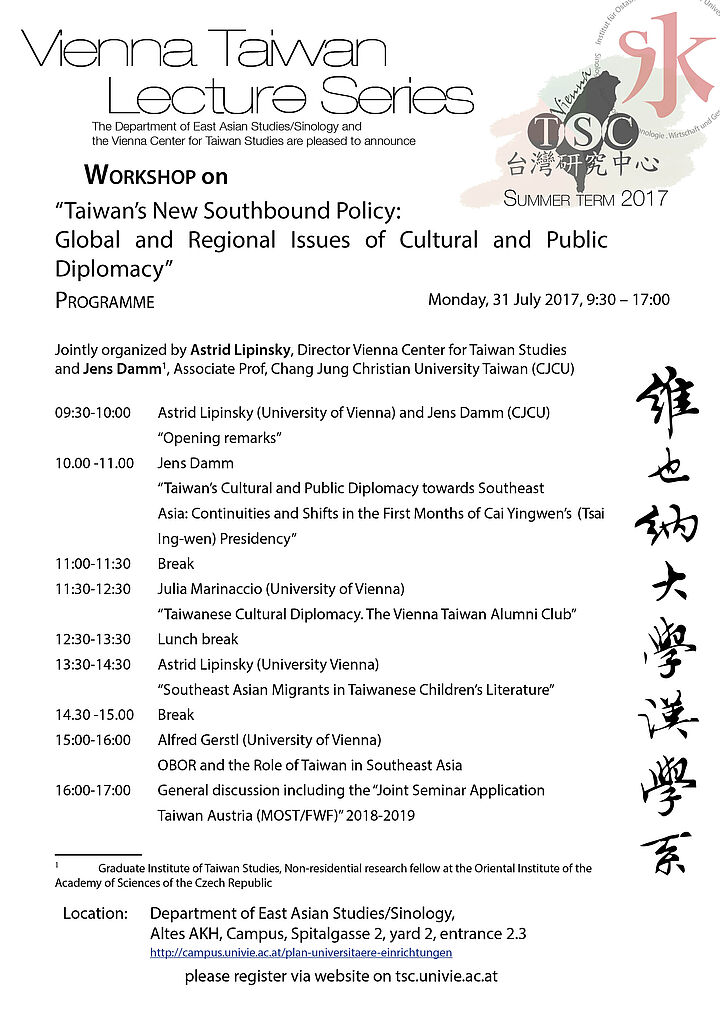Montag, 31. Juli 2017, 09:30 - 16:00 iCal
“Taiwan’s New Southbound Policy
Global and Regional Issues of Cultural and Public Diplomacy
SIN 1, Department of East Asian Studies
Spitalgasse 2 Hof 2 Entrance 2.3, 1090 Wien
Seminar, Workshop, Kurs
Since the inauguration of Tsai Ingwen as new president of the ROC (on Taiwan), a foreign policy shift has become obvious: cross -Strait relations have been replaced by a new focus on Southeast Asia (a new Southbound policy, the first southbound policy was introduced under Lee Tenghui), while cross- Strait relations have become increasingly sidelined within the Taiwanese discourse.
My training as a sinologist, my current working experience as an associate professor at the Graduate Institute of Taiwan Studies Chang Jung Christian University, as well as my work as Principal Investigator (PI) on a three year- research project as Research Fellow at the Oriental Institute of the Academy of Sciences of the Czech Republic, will allow me to make a valuable contribution to the discussion on "China's Cultural Diplomacy and the Role of Non-State Actors", 2015-2018 (PI) (GARC). The following issues will be taken into account:
1) Changes in Taiwan itself: the changes within the governing party, from the KMT under MA Yingjiu to the DPP under Tsai Ingwen have been strongly focused on Taiwanese sovereignty. One of the aims is to improve relations with a variety of states, including states in Southeast Asia, such as Malaysia, Singapore, the Philippines, and Indonesia; Taiwan’s relationships with Japan and the US are also being re-evaluated.
2) Changes in China: China’s domestic policies do not primarily include Taiwan in the focus. Relations with the South China Sea are shaped – in the view of China – by positive redeployments, such as Duterte in the Philippines, who wants to exit the US orbit, as well as by negative developments, for example, the increasing number of civil society protests in Malaysia and Singapore against Chinese immigration and investment. At the same time, China’s economic development has given rise to concern and SEA states are seeking a broader portfolio, not only looking toward China
3) Japan: due to domestic issues (Abe), but also taking into consideration the waning importance of China, Japan is once more discussing its future global role. This could offer some hope for Taiwan in the international sphere.
Nevertheless, Taiwan’s public diplomacy and cultural diplomacy is still hindered by the overarching “One China Policy”, which, in the author’s opinion, despite all the hopes expressed by the current Taiwanese administration, is not really being questioned: neither the new US president, Trump, nor Abe, are really willing to renegotiate the internationally- accepted one China policy. Taiwanese politicians and the public are too easily lured by some US and Japanese comments: although these seem to offer a greater space for Taiwan, they clearly underestimate the dominant role played by China, especially the importance of China in strategic, economic and increasingly ecological terms.
Vienna summer workshop with colleagues next Monday, 31 July 2017, title “Taiwan’s New Southbound Policy: Global and Regional Issues of Cultural and Public Diplomacy”
for the announcement see tsc.univie.ac.at/fileadmin/user_upload/p_TaiwanStudyCenter/pictures/taiwan_lecture_series/announcement/ss2017/170731_dammws.pdf
The abstracts: tsc.univie.ac.at/fileadmin/user_upload/p_TaiwanStudyCenter/pictures/taiwan_lecture_series/announcement/ss2017/brochure_20170731.pdf
The ws is deliberately small, we only asked colleagues, especially younger ones doing their PhD here to discuss future development in the field.
Furthermore, we would like to invite to the coming Vienna Taiwan Lectures, at:
Please note the dates! Details will be available on our website soon.
See you in Wien!
Zur Webseite der Veranstaltung
Veranstalter
Vienna Center for Taiwan Studies
Um Anmeldung wird gebeten
Kontakt
Astrid Lipinsky
Universität Wien
Sinologie
4277 43844
astrid.lipinsky@univie.ac.at
Erstellt am Freitag, 28. Juli 2017, 12:08
Letzte Änderung am Montag, 07. August 2017, 09:56

